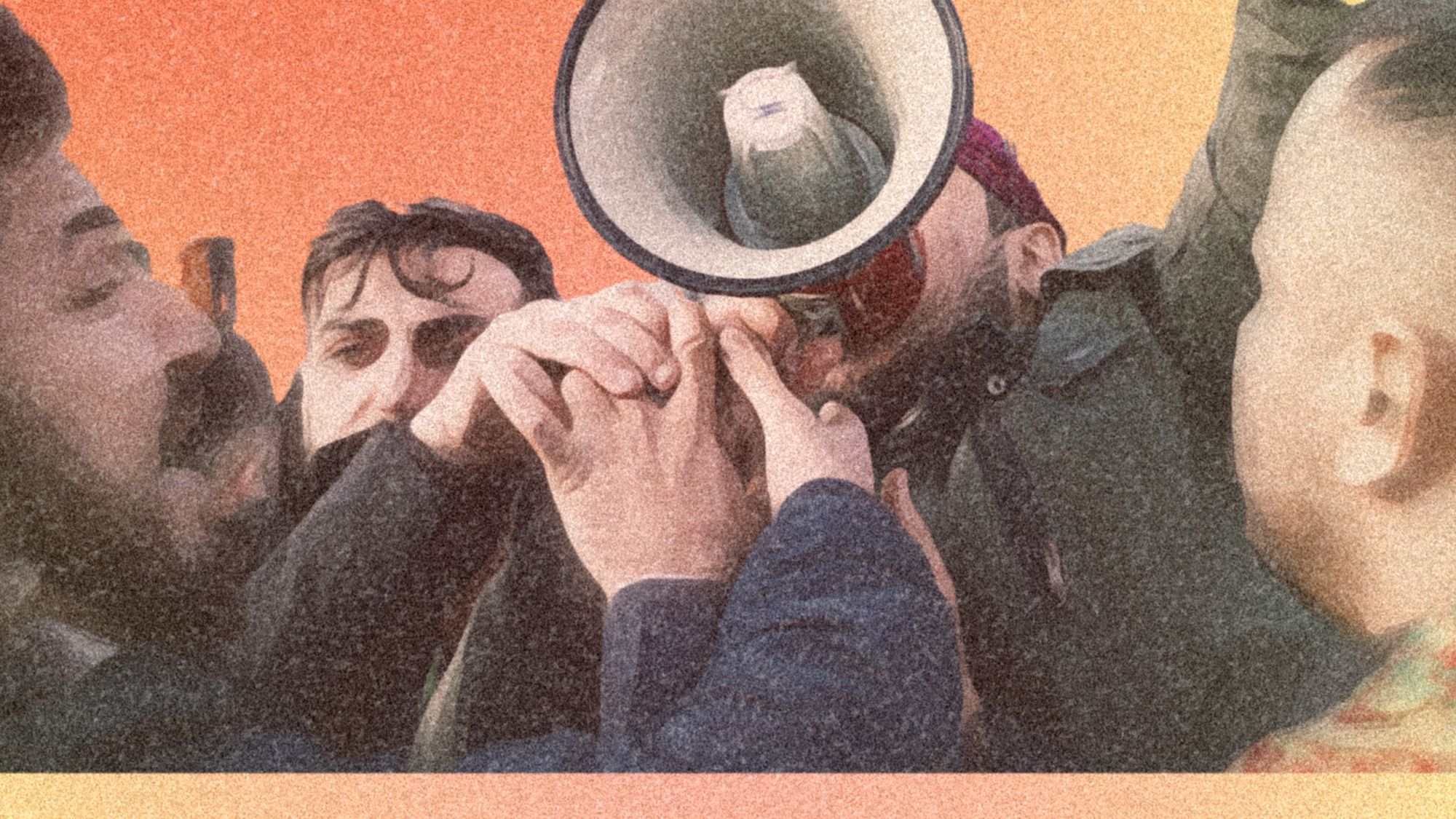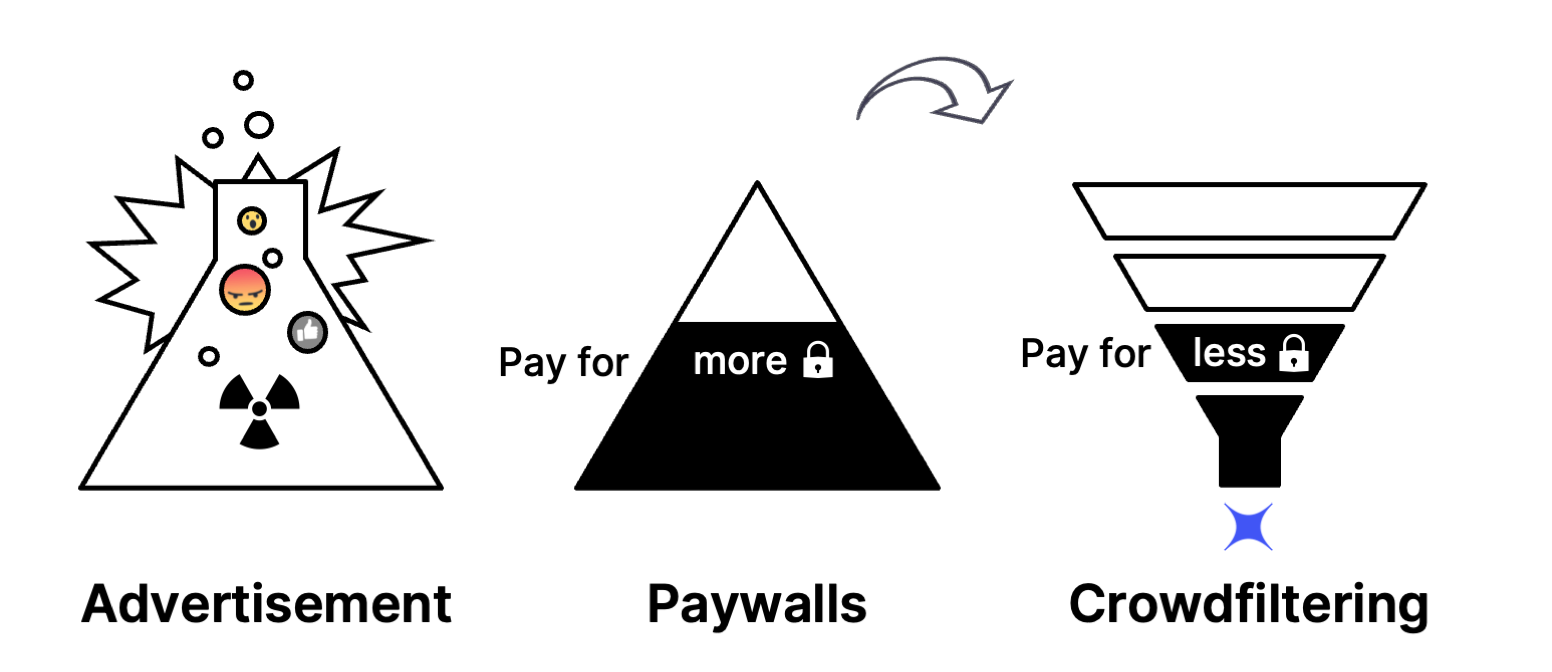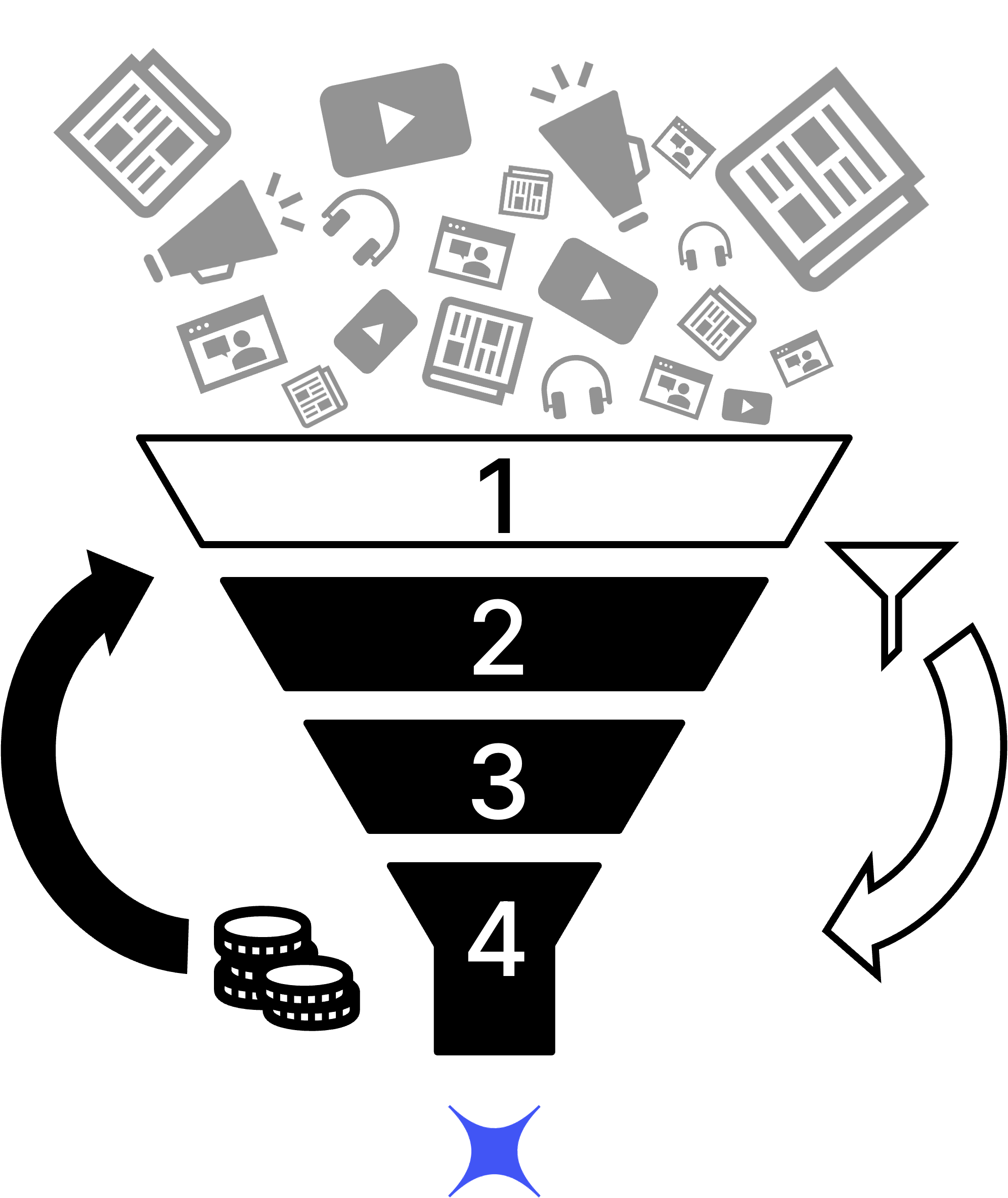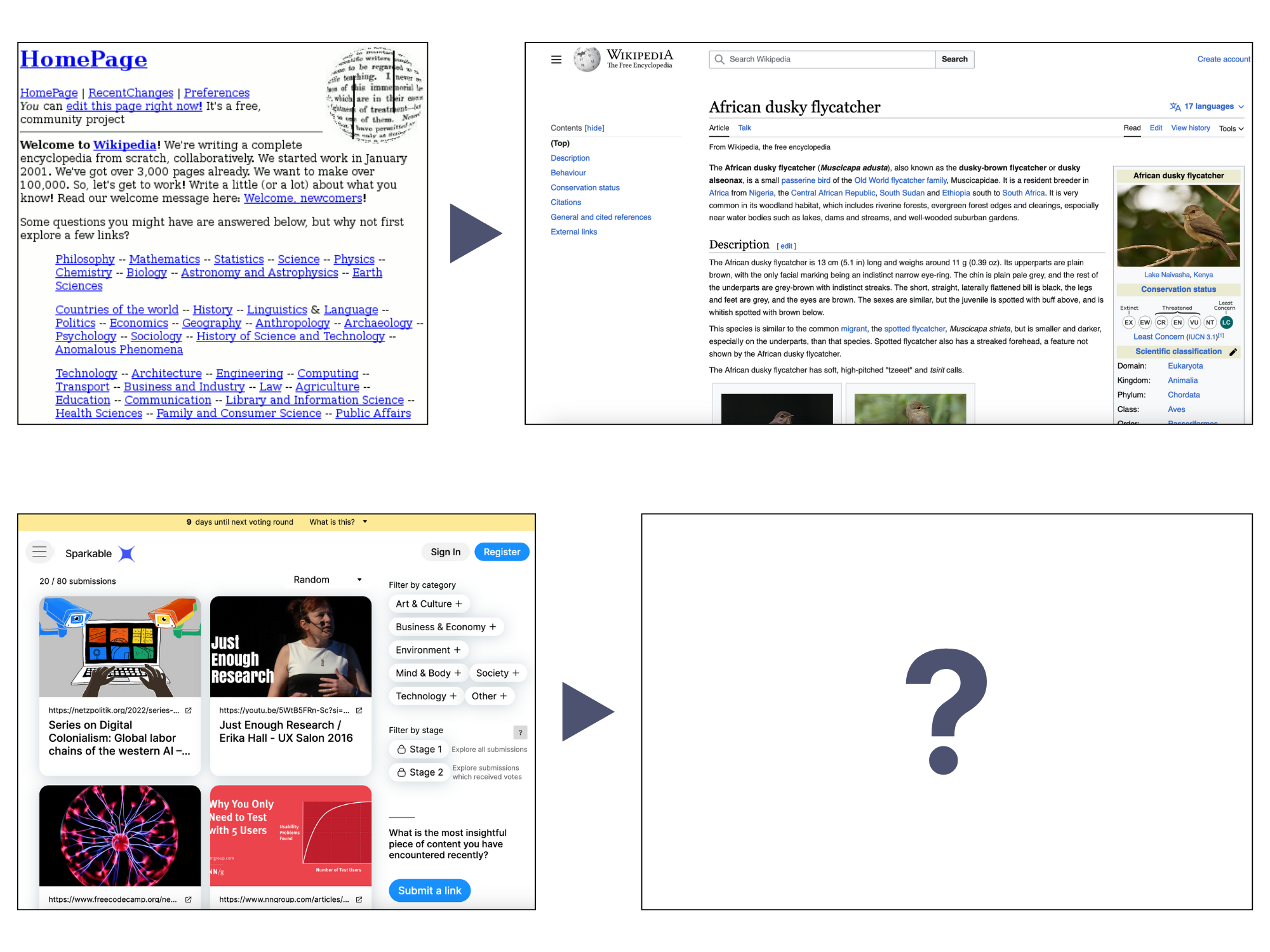The attention economy is tearing apart our social fabric. We urgently need a new model for the internet.
The ad-driven business model is toxic for our minds and society. Paywalls aren't working as an alternative. How can we build a better model?

My last post described why I quit everything to build a new platform business model for a healthier information environment. This post will discuss the new model in detail.
First, let's look at the situation today:
The advertisement model is wreaking havoc.
The ad-based business model (a.k.a. engagement or attention economy) dominates our information environment. Platforms get paid by advertisers to make us look at their ads. So, they have a financial incentive to maximize our engagement and make us spend as much time as possible on their site to show us more ads and increase their profits.
This might sound harmless but it comes with dangerous hidden costs to our minds and society:
- We‘re losing crucial abilities like memory, focus, and making sense of the world. [1]
- We're losing shared understanding; our society is increasingly polarized. [2]
- Social media algorithms have been blamed for radicalizing users. [3]
This is dangerous, not at least because we're facing global crises that require collective sensemaking to solve them. If we can't make sense of the world together, we stand no chance of overcoming the complex issues we face as a planet. We need a functioning, productive, empathic information environment that incentivizes synthesis, understanding, and collaboration instead of screaming at each other.
The paywall model doesn't work anymore.
The most prominent alternative to the toxic advertisement model today is the paywall model. In this system, you get free access to some content and must pay to access more.
This model originated in the last century when information was scarcer, so people were willing to pay for the privilege of getting more information. But the internet, combined with the ad-based model and free access to information, has turned this logic upside down:
Today, we‘re drowning in information. That‘s why the privilege now is not access to more but less but better content.
This leads to a fundamental asymmetry in our information ecosystem where today:
High-quality content is hidden behind walls, while the worst content spreads virally, accessible for free.
Another problem with the paywall model is that it exacerbates existing inequalities because only people who can afford it can access all high-quality information.
Paywalls also increase the effect of filter bubbles, as they trap us into one single publication or medium. So, we have to pay multiple subscriptions if we want to get various viewpoints. Not many of us are willing or able to do this, especially not over time. In summary, the paywall model sets the wrong incentives, too.
We need a new model for the internet. Urgently.
While working on a new nonprofit business model, I've been driven by this thought:
How and where we spend our global attention has the power to change the world. So, how we design the systems that govern our collective attention may well decide our fate as a planet.
We need a new model that increases understanding and collaborative problem-solving, not engagement and polarization.
This new model should:
- Ensure free and open access to everything.
- Ensure high-quality content.
- Tap into today‘s need for less but better content instead of more.
- Incentivize a healthier information ecosystem instead of engagement.
- Financially reward anyone who contributes to this healthier ecosystem.

Crowdfiltering might be a solution.
Here starts the idea: What if we turned the paywall on its head? What if, instead of seeing some content and paying for more, you could see all content for free or choose to pay to see less but better content?
What if this new model optimizes for understanding and societal health, instead of engagement and attention?
We're testing that with a small team and a growing community at the nonprofit Sparkable. We call it crowdfiltering.

How it works
Short version:
- See link submissions to existing high-quality content on the web that has sparked new understanding for others.
- Make your own submissions and get points.
- Participate in the recurring voting to select the most high-quality submissions and get points.
- Spend your points to see only the most high-quality submissions selected by the crowd.
- Your spent points are then redistributed to the submitters, the voters, and the platform, making it a circular and self-sustaining system.
White paper
Learn about all the details here:
Frequently asked questions
Who decides what is high-quality content?
Everyone together. The platform only gives guiding questions for decision-making (e.g., was it insightful, peaceful, uniting, solutions-focused, etc.), and every person brings their definition of such content to Sparkable. Then, the wisdom of the crowd should lead to a shared understanding of what high quality means for the broadest, most diverse range of people.
How do we avoid bias, trolls, hate, or destructive coordinated behavior?
In short, the crowdfiltering model of Sparkable is divided into four distinct stages with different sets of people on it, which separates the power. Unlike big attention-driven platforms, Sparkable has every “business” incentive to act against those dangers.
• No one can be at all stages simultaneously, so no one has control over the whole curation process on Sparkable. You are only allowed into the next stage if you “prove” your investment in the vision of more mutual understanding by submitting or voting for such content. Like Wikipedia, the aim is to build a resilient community to deflect such attacks.
• All incentives on Sparkable aim to discourage and sanction destructive behavior. Spam and abusive content can be reported and removed from the platform.
• All aspects of the platform are designed to be slow and calm. For example, you can’t like or react to something instantly. The voting happens only later, making virality impossible and incentivizing timeless, high-quality content.
How is it different from other sites / platforms?
In short: It’s the business model. Sparkable is not ad-based or paywall-based but has an entirely new not-for-profit business model of crowdfiltering which allows the platform to set all incentives to lead to a healthier information environment.
Sparkable vs. social platforms (e.g., Twitter, Reddit, ...)
• No algorithmic recommendations that keep you scrolling forever.
• Measures and rewards long-term insight and understanding instead of clicks, upvotes, likes, or follows.
• Aggregates existing content, not another platform generating more content.
Sparkable vs. traditional media (e.g., CNN, BBC, ...)
• No hyper-current news but rather long-term insight and understanding.
• See content from all kinds of sources, not just one medium.
• Aggregates existing content, not another platform generating more content.
People-first: This project needs you!
After conceptualizing this new system, I tried to find others to improve it and make it a reality. I've been lucky to have outstanding folks contribute their thoughts, time, and work toward this. A huge thank you to all of you!
As an example, one of the core ideas that we added to the model later, originated with an advisor to the project. To solve the popularity bias, she invented the "insight ratio" metric as an alternative to engagement metrics such as clicks, likes, or upvotes. Now, we measure the percentage of how many views something got compared to how many votes it received later. This way, content that gets many views has no advantage as it does on other platforms.
We also changed our view about the result of the crowdfiltering being directly accessible for paying users (we found a way to implement this without influencing the voting process) thanks to feedback from an online user.
All this is to say that Sparkable is an open-source project by the people, for the people. As such, it needs your input and help while allowing you to co-create a solution, hopefully, for a healthier internet.
What can I do?
If you're interested, please:
- Send me your questions, feedback, ideas, or constructive criticism via email: support@sparkable.cc
- Join the Sparkable Slack channel to participate in ideation and co-creation workshops.
- Join the Sparkable mailing list (and mine) for updates.
- Follow Sparkable (and me) on LinkedIn.
Thank you! ♥️

The future
Sparkable is in its earliest stage. How can we build it together so that it will change the world for the better? In an upcoming article you'll hear about the current open questions around Sparkable and how you can help shape it.
